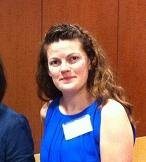AUTHOR: Elyse Rosa

Alison Fenney was a PhD student in the MiNDS program working with Dr. Timothy Lee. Alison defended her thesis in the fall of 2011. While working with Dr. Lee, her PhD project focused on the role of motor information in learning and behaviour in the presence and absence of physical or cognitive challenges. Since graduating from the MiNDS program, Alison has had a very successful career, starting with work at the Ontario Brain Institute and now with the Neurotechnology Industry Organization in San Francisco. Alison was kind enough to take time out of her busy schedule to answer a few of our questions about how she translated what she learned as a MiNDS student to her current career.
- Please explain in some detail what it is that you are currently working on (give us an idea of your ‘job description’)
- I currently work at the Neurotechnology Industry Organization (NIO), the trade organization for neuroscience companies, research institutes, and patient advocacy groups globally. My job description involves bringing together the commercial neuroscience community, advocating for the industry’s position to regulators and policy makers and hosting a lot of events to stimulate investing and partnering. (Translation: organizing conferences, researching public policy, writing market reports, creating databases, managing relationships, LOTS of email correspondence)
- In what ways do you feel that the MiNDS program helped prepare you for your current career?
- To start off Kathy’s behavioural interviews for MiNDS applicants are great prep for what interviews will be like once you graduate. Second, the opportunity to participate in diverse TAships—I was part of Out of Our MiNDS before it got that cool name, conference planning and guest speaker lunches. Third, the flexibility of the program’s administration to allowed me to concurrently take an MBA which made a big impact on my career readiness.
- Could you elaborate on how you went from being a MiNDS student to the position you have today? What steps did you take to launch your career specifically?
- Networking and relationship building is everything. People underestimate the value of knowing people and having support along the way. While in the MiNDS program, I would volunteer and participate in a lot of extracurricular activities. Through one in particular, an industry day run by MILO, I made invaluable connections that directly lead to my second job. I should take this opportunity to thank Lori Dillon for that (Lori you rock!). Prior to graduation, I took a number of informational interviews, with anyone who would meet with me, and then everyone they knew who would meet with me. Those experiences help fine tune your self pitch and help you learn about what different jobs/careers are really like. To sum up, meet people, take opportunities that present themselves and craft a good self-pitch.
- What were some of your fondest memories of being a MiNDS student?
- Softball, the Hooker dinner, karaoke with Istvan Mody, and s*** disturbers journal club at the Phoenix (the original). I made some of my best friends in the MiNDS program, and we went through a lot together, and those same people are a key part of my personal and professional network today.
- Do you have any advice for current MiNDS students who are unsure of how to translate their current research interests into a potential career path?
- Start exploring careers, jobs and organizations now. Take informational meetings (but be prepared); it is more competitive than ever for recent grads to gain full time academic roles or transition beyond the bench (each has its own challenges). You need to differentiate yourself through your ability to communicate briefly and concisely, to build relationships, and to utilize your network.